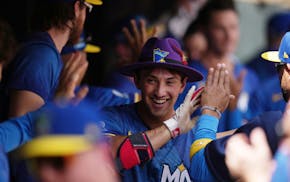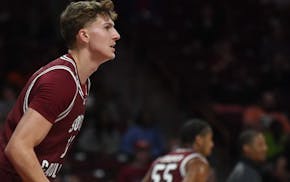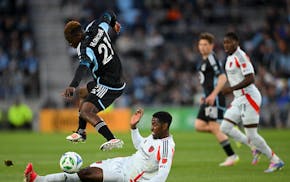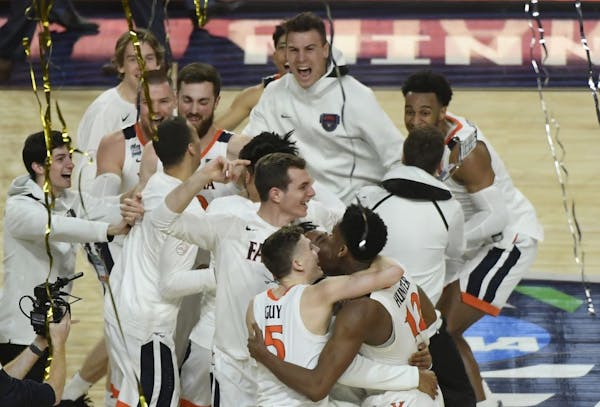Carla Williams wasn't sure she was going to join in the ritual. While the celebration swirled around her Monday night, the Virginia athletic director stood in a tangle of streamers and confetti, as her children urged to take her place atop a ladder and snip a piece of the net.
"I don't know," she said, warily eyeing the line of players marching up to the hoop at U.S. Bank Stadium. "I might leave that to them."
Following Virginia's 85-77 victory over Texas Tech for the NCAA title, a tradition born in 1947 — cutting down the net as a championship souvenir — seemed to go on as long as the overtime game. And at the Final Four, the Cavaliers didn't just climb to the rim on any old purchase from the hardware store.
The event has had an Official Ladder for the past 11 years, giving the manufacturer, Werner, one shining moment of global TV exposure every spring. This Lamborghini of ladders is a yellow-and-blue podium model, which has a platform to stand on and a guardrail at the top. The one used at the Final Four is custom-made, with a higher guardrail and wider platform designed for the supersized user.
Naturally, there also is an Official Scissors of March Madness, a custom set of Fiskars with gold, NCAA logo-clad titanium blades. Monday, the players followed a protocol to avoid any postgame trips to the emergency room. After each one trimmed a bit of twine and held it up for a cheer, he put the scissors into a specially designed slot on the ladder's guardrail.
Williams eventually gave in, sharing a college tradition that originated with North Carolina State coach Everett Case. By the way, though you can't purchase an exact replica of the Final Four ladder, you can buy a similar model if you want to feel like Kyle Guy when you're cleaning the gutters.
Voice of champions
Sports fans in Chicago don't like sharing, at least when it comes to their public-address announcers. Over the past few days, with the White Sox on a long home stand, several of them were griping that Sox announcer Gene Honda had been loaned out — for the 17th year in a row.
Honda is flattered that they missed his clear, mellow baritone, but he hopes they understand his absence. "Just look around," he said Monday, gesturing as 72,062 people began filling the stadium. "It's the Final Four!"
One of the busiest announcers in the business, Honda, 65, has been giving the Final Four its in-arena soundtrack since 2003. From his courtside seat, he kept fans apprised of substitutions, fouls, timeouts and the occasional reminder not to throw anything on the floor.
Honda works for the White Sox, the Chicago Blackhawks, DePaul men's basketball, the Chicago Marathon, the Big Ten men's basketball tournament and PBS. He's also announced at the World Series and other big events, but nothing moves him like March Madness.
"I'm lucky," he said. "I get one championship a year, no matter what."
How much?
Sports fans are used to sticker shock at big events, but some things can still take one's breath away. At U.S. Bank Stadium, Final Four programs cost $20, a can of domestic beer was $9.50 and a plastic ticket sleeve and lanyard was $15.
That didn't seem much different from other events there. But one sign outside the stadium Monday was not a misprint, nor was it something often seen in the Twin Cities: Parking at the Fleet Farm ramp cost $80.
And finally ...
• When the Cavaliers stood on a podium for the trophy ceremony, they were hit with confetti from three portable cannons stationed behind the scaffolding. It provided a nice souvenir; many people on the floor were stuffing it in their pockets, and collecting the gold and silver streamers to take home as well.
• That funky sax man who performed the national anthem was Air Force tech Sgt. Johnny Holliday, a member of the Security Forces Squadron at the Minneapolis-based 934th Airlift Wing.
• Texas Tech students had to be reminded that one of their customs — throwing tortillas during the game — was not allowed. Both soft and crispy tortillas were being chucked, with the crisp ones exploding like clay targets.

Twins keep it close until late-game horrors in 6-1 loss to Red Sox

'It's been different': Lee showing improvement as hitter in second season

Reusse: Wild and Wolves gives Minnesotans reasons for joy despite the expected heartbreak

Tyler Herro's brother Austin transfers from South Carolina to St. Thomas

